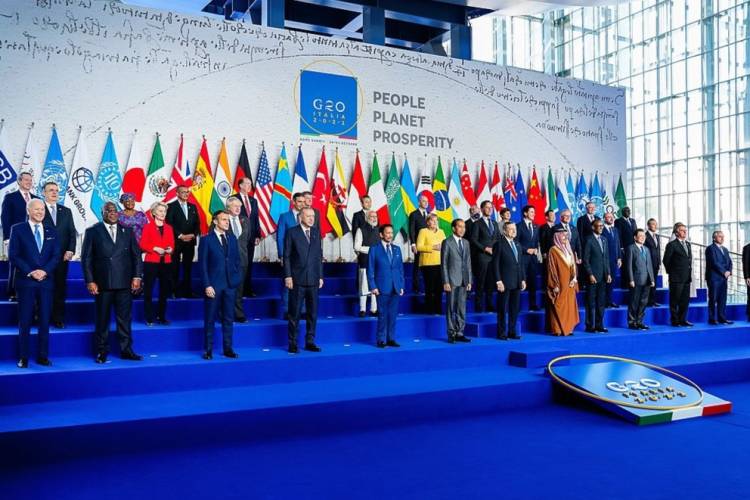G20 Brazil: As the G20 Summit unfolds in Brazil, coinciding with the fraught COP29 in Baku, the global climate agenda finds itself at a crossroads. The world faces a grim reality: the 1.5°C target set by the Paris Agreement may soon become unattainable. Yet, this does not spell the end of the fight against climate change—it demands a recalibration of strategy, ambition, and accountability. Brazil’s leadership of the G20 provides a pivotal opportunity to reinvigorate global climate commitments, align financial mechanisms, and reinforce multilateral cooperation at a time when it is most needed.
For nearly a decade, limiting global warming to 1.5°C has symbolised the collective ambition to mitigate catastrophic climate impacts. However, 2024 marks a turning point: temperatures have already edged perilously close to the threshold, with the global average likely to breach it for the first time. This stark milestone underscores the inadequacy of existing climate policies, especially among the world’s largest polluters.
READ | The product nation blueprint: Challenges and opportunities for India’s manufacturing leap
At COP29, the stubborn focus on the 1.5°C target has highlighted a deeper issue: a lack of consensus on what comes next. Should the world pivot to a higher target, such as 1.6°C or 2°C? Or should the focus shift entirely to halting emissions (“real-zero”) or addressing the overshoot through carbon removal technologies? This lack of clarity risks paralysis, particularly when public despair over the perceived failure to meet 1.5°C threatens to erode climate momentum.
G20 Brazil: Leadership by emission and example
The G20 nations bear a disproportionate share of the climate burden—they are responsible for over 75% of global greenhouse gas emissions and command 85% of the global economy. Their policies, therefore, hold the key to whether the world can course-correct. Climate finance has emerged as a central theme of both COP29 and G20 Brazil. Developing nations, particularly those most vulnerable to climate impacts, have called for at least $1 trillion annually in financial support. This funding is essential for transitioning to renewable energy, building resilience to climate impacts, and meeting adaptation needs.
Yet, negotiations remain mired in disputes over who should contribute, with developed nations pushing for wealthier developing countries, such as China and Middle Eastern oil producers, to share the burden. The breakthrough at the G20—a voluntary commitment by developing nations to contribute to climate finance—is a step forward. However, the reluctance of rich nations to commit substantial new resources undermines trust and jeopardises the success of future summits, including COP30 in Brazil.
The return of Donald Trump to the U.S. presidency threatens to derail global climate cooperation. His plans to withdraw from the Paris Agreement and roll back domestic climate legislation could strip momentum from global efforts, especially if the world’s second-largest polluter disengages from international commitments. This makes the leadership of other major economies, particularly the EU, China, and host Brazil, even more critical. Brazil’s ambitious “Mission 1.5” initiative seeks to rally nations around the Paris Agreement’s most ambitious target, despite the mounting challenges. President Luiz Inácio Lula da Silva has emphasised the need for sustainable development, poverty alleviation, and climate equity, framing these as interconnected goals.
Lula’s focus on the Amazon rainforest as a global climate asset underscores Brazil’s unique role in the climate fight. As home to the world’s largest tropical forest, Brazil holds a key to both carbon sequestration and biodiversity preservation. Efforts to protect the Amazon must be matched by international financial support, especially given the economic pressures driving deforestation. Brazil’s push for reforming multilateral financial institutions aligns with its climate agenda. Existing mechanisms often fail to provide timely and adequate support to developing nations. By leveraging its G20 presidency, Brazil can advocate for a more equitable distribution of resources and a shift towards grant-based rather than loan-based climate finance.
The way ahead: Towards climate change solidarity
The outcomes of the G20 and COP29 will shape the global climate trajectory for years to come. Scaling up climate finance is imperative, with the G20 needing to deliver a clear, enforceable commitment to mobilise $1 trillion annually. Contributions from both developed and wealthy developing nations are crucial, alongside mechanisms to channel private sector investments into green projects. Strengthening multilateralism is equally important, as the G20 can reinforce the role of multilateral institutions in driving climate action, particularly through reforms that prioritise climate equity and resilience.
As the 1.5°C goal slips out of reach, the world needs a new framework that balances realism with urgency. This could include a focus on emissions reduction trajectories, technological innovation, and strategies for limiting the overshoot. The G20 must also hold its members accountable with binding commitments to reduce emissions and phase out fossil fuel subsidies. Additionally, empowering vulnerable nations requires rich countries to honour their promises of financial and technical support while ensuring these nations have a strong voice in global decision-making.
The twin crises of climate change and geopolitical instability demand unprecedented levels of cooperation and ambition. As the G20 convenes under Brazil’s leadership, the world looks to these 20 nations for decisive action. Failure is not an option—for the planet, for the vulnerable, and for future generations. The G20 must rise to the occasion, not just as economic powerhouses but as stewards of a shared future.

